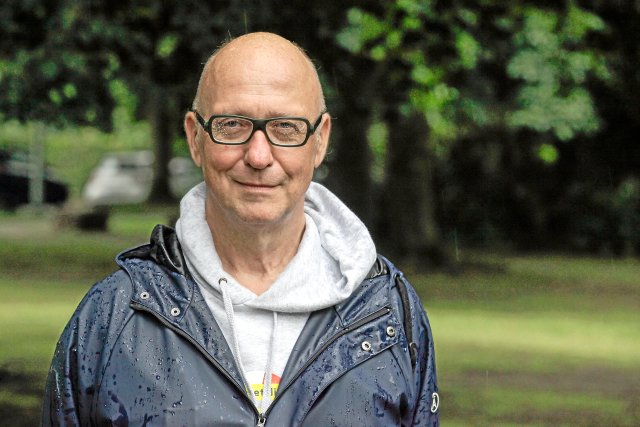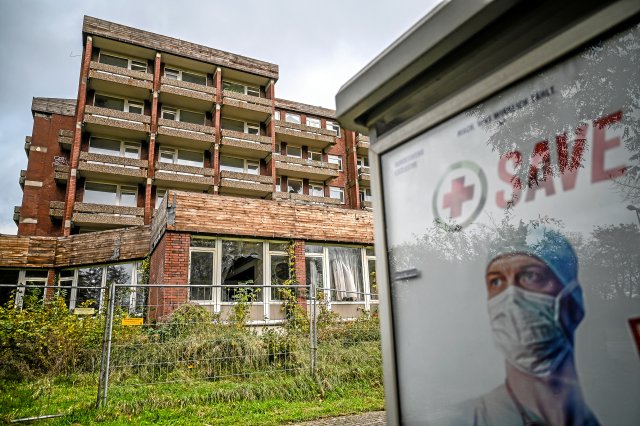Duisburg | Local elections in North Rhine-Westphalia: The lost heart of social democracy
Hendrik Thome stands in front of his information booth and is convinced: "Most people here aren't real Nazis." When he warns about the party's goals, many people in Duisburg-Neumühl would think twice, he says. Thome wants to run for the Duisburg-Hamborn district council for The Left Party, which also represents Neumühl. He's wearing a green, round sticker. In the center is a cute polecat with a raised fist, surrounded by the words "Love Iltispark Hate Nazis." "This is my initiative for Neumühl," he explains. "A gentle Antifa that rebuilds human solidarity in the district." The expansive park in the north of Duisburg is a positive reference point for him.
The AfD received 36 percent of the vote in Neumühl in the last federal election in February. This was a record for the far-right party in Duisburg, where it also received 20.9 percent. A similar scenario looms in the upcoming local elections. The AfD's mayoral candidate for Duisburg, Carsten Groß, could even make it to the runoff. The entire north of Duisburg – once a heartland of the Social Democrats – has long since become an AfD stronghold.
This strong performance by the far right in the federal election was a turning point for Thome. "I want to actively oppose the AfD. This is my service to democracy," says the 65-year-old. He stands at his small information stand, wearing large, rimmed glasses, sorting leaflets and flyers. Several young people help him at the stand. Interested visitors stop and look. Thome, who works as a judge at the Hamborn District Court, speaks gently, friendly, and clearly.

Neumühl is a traditionally working-class district. Coal mining began here in the 19th century. The Thyssen-Krupp steelworks is nearby. Various nationalities and cultures live side by side in the district. After the mine closed in 1962, the surface facilities were demolished, and the residential buildings were also slated for demolition. But residents fought to preserve their mining settlement and were able to save some of the buildings. Typical 1970s apartment blocks were built around the settlement, which now characterize the townscape. Many Russian-Germans and ethnic Germans from Poland have found a new home in the area.
St. Barbara Hospital is a notoriously abandoned place in Neumühl. The brick building is currently vacant and is slated for foreclosure. In 2015, a central reception center for refugees, primarily from Syria, was built there. "Many Neumühl residents were very committed to the integration of the refugees," Thome recalls. "Several have since acquired German citizenship and enjoy living in Neumühl." But he knows that these stories of successful integration cannot disguise the fact that cohesion in the neighborhood is crumbling.
Thome knows how difficult the situation in Neumühl is for him. "On my walks, I keep hearing: 'I'm voting for the AfD so that things will change; the other parties have failed.'" For him, the polls that promise strong results for the AfD are a symbol of frustration, anger, resentment, and fears of decline. But unlike eleven years ago, when the first refugees arrived, there are currently no Nazis shouting right-wing extremist slogans in the streets. Latent racism prevails, coupled with frustration and social envy. Nazi marches like those in Dortmund-Dorstfeld have not yet taken place in Neumühl.
Behind closed doors, a man from the former Soviet Union explains: "At least 75 percent of the people living here are foreigners. That's threatening." When asked what was worrying about that, he replies: "They steal, rob, and threaten us; we don't feel safe."

Thome is trying to understand what makes the AfD so strong, especially in Neumühl. During his door-to-door visits, he also encounters Syrians, Poles, Russians, Ukrainians, and Iraqis. "The neighborhood usually works," he notes. AfD supporters and opponents live close together here. "Nevertheless, the tone remains neighborly, sometimes even cordial." Political debates are often avoided. But despite this, he increasingly encounters people who demonstratively profess support for the AfD.
Dispute over illegal livingThe anger in the apartment complex on Otto-Hahn-Straße was a major blow for many residents. Bulgarians and Romanians were alleged to have moved in with fake rental contracts. As the situation escalated last year, the mood became significantly more tense, Thome recalls. "Numerous residents rallied behind the demand that the people move out." Police raided apartments on several occasions with large numbers of officers.
It is expected that even more voters will turn away from the SPD and the CDU in this local election in Duisburg . The two major parties already suffered significant losses in the last city council election. Manfred Güllner, managing director of the Forsa polling institute, explained in the "Westdeutsche Allgemeine Zeitung" that 39 percent of AfD voters in North Rhine-Westphalia chose the AfD because they were dissatisfied with the other parties. Furthermore, federal politics will likely influence the voting decision: A survey showed that 31 percent of AfD voters intend to vote for the radical right in the local election as a reaction to federal politics.
This mood is reflected in Jarko, who is standing in front of a supermarket. He wants to do some shopping but needs to smoke up quickly. When asked about the local elections, he says he's voting for the AfD. "I'm fed up. The migrants are pulling our leg." He mentions garbage dumps, thefts, and robberies, which he blames on immigrants. He has no evidence for this. Only once did he see young Roma snatch an elderly lady's bag outside the discount store. He tried to help, but then thought: "Stop, they're probably all carrying knives."
Of course there are problems, Thome agrees. Many, in fact. "But this one-sided and blanket disregard for these people has been deliberately brought about over the years." This is also the case with the SPD, led by Mayor Sören Link, who once said he would rather accept Syrians than Roma, as well as migrants from Romania and Bulgaria, in Duisburg. All of this is a perfect opportunity for the AfD.
Thome wants to distance himself from this. "I want to show that it's possible in a democracy to achieve positive changes that move our city and all its residents forward," he explains. Even though he knows that his election campaign alone isn't enough to "get the right-wing slogans out of people's heads."
nd-aktuell



